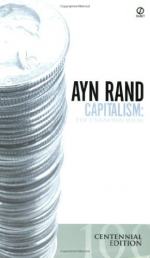
|
| Name: _________________________ | Period: ___________________ |
This test consists of 15 multiple choice questions and 5 short answer questions.
Multiple Choice Questions
1. How does the author think the U.S. government does with creating property rights in airwaves?
(a) The author feels the government succeeds.
(b) The author feels the government fails.
(c) The author feels the government needs to modify its approach.
(d) The author feels the government does a good job.
2. The bloodiest conflicts in history have been _______ _______.
(a) Civil wars.
(b) Area wars.
(c) Local wars.
(d) World wars.
3. Who brings the airwaves under U.S. government control?
(a) Grossman.
(b) Herbert Hoover.
(c) Eisenhower.
(d) FDR.
4. What is another word for statism?
(a) Collectivism.
(b) Communism.
(c) Connectivism.
(d) Concernism.
5. Who is the author of the antitrust chapter?
(a) Alan Greenspan.
(b) Arnod Greenspan.
(c) Arnold Greenspan.
(d) Alex Greenspan.
6. What does the term "evils of monopoly" refer to?
(a) Corrosive monopoly.
(b) Coercive monopoly.
(c) Coevasive monopoly.
(d) Corrupt monopoly.
7. The term "evils of monopoly" refers to a situation in which the monopolist is completely ______ of the market.
(a) Independent.
(b) Evasive.
(c) Demanding.
(d) In control.
8. What is one of the negatives that political power uses?
(a) Threat of imprisonment.
(b) Taxes.
(c) Regulation.
(d) Restrictions.
9. According to classical economics, what is the basis of competition?
(a) Producing and selling in a down market.
(b) Producing and selling as much as possible.
(c) Producing and selling in a regulated system.
(d) Producing and selling for profit.
10. Who does Algeria fight for independence?
(a) Germany.
(b) France.
(c) Britain.
(d) Spain.
11. According to the author, what kind of governments use weapons against their own people?
(a) Communists.
(b) Democracies.
(c) Republics.
(d) Dictatorships.
12. What right does the author believe is basic to the concept of freedom?
(a) Self-governance rights.
(b) Human rights.
(c) Property rights.
(d) Familial rights.
13. The Federal Reserve System was created when the government thought that what was happening?
(a) A shortage of bank reserves.
(b) A depression.
(c) A shortage of interest reserves.
(d) A recession.
14. The author believes that businessmen take the blame for what?
(a) Capitalism.
(b) Recessions.
(c) Government actions.
(d) Depressions.
15. The Aluminum Company of America is a monopoly in the sense that it has control over what?
(a) Its price.
(b) Its suppliers.
(c) Its independence.
(d) Its sellers.
Short Answer Questions
1. Branden says that public education is not a ______ _______ because it must be paid for.
2. What subject does Stewart Holbrook write about?
3. How does government regulation, according to the author, try to protect the consumer?
4. During the Industrial Revolution, where do many children find jobs?
5. What thrives on free trade, according to the author?
|
This section contains 415 words (approx. 2 pages at 300 words per page) |

|




